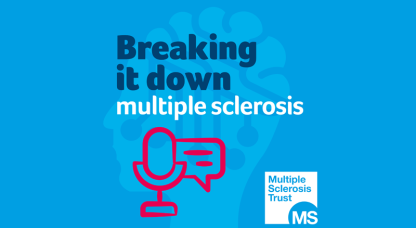Poor sleep and sleep disorders are thought to be more common in people with MS than the general population and they can contribute to making fatigue worse. Daytime sleepiness is often an overlooked issue in MS and this study was a review that summarised what we know so far about it in MS.
The analysis showed that daytime sleepiness was observed less often than fatigue in people with MS and was usually less severe, but it had a significant impact on the people it did affect. This daytime sleepiness was also associated with sleep disorders such as disrupted sleep and poor sleep quality, and the data suggested these were underdiagnosed and undertreated in people with MS.
The authors highlight the risk that the sleepiness may be overlooked in someone who has fatigue, as it may be considered to be just part of their fatigue. The sleepiness may be an indication of another health condition, other problems or symptoms that are affecting their sleeping pattern and if this is recognised they can be treated appropriately and see benefits to their day to day life and possibly also in their levels of fatigue.
Fatigue is one of the most common symptoms of multiple sclerosis and it is very different from the tiredness or exhaustion that people without MS may have. It is also distinct from sleepiness, but poor sleep and sleep disorders are thought to be more common in people with MS than the general population and they can contribute to making fatigue worse. Sleepiness is often an overlooked symptom in MS and there has been a lot less research looking at it than investigating fatigue. This study summarised the status of the research so far to try and determine how common and how severe daytime sleepiness is in people with MS.
How this study was carried out
This study was a review which pooled the previous research that used the Epworth sleepiness scale (ESS) to assess daytime sleepiness in people with MS. The ESS has eight questions which ask about the likelihood of falling asleep or dozing off (in comparison to just feeling tired) in different everyday situations, such as while watching TV or sitting and reading. The scores are in a range of 0-24 and a score greater than 10 indicate increased daytime sleepiness.
To be included in the review studies had be:
- published after 1991, which was the first year the ESS was available,
- had to use the ESS to assess sleepiness and have data available about its use,
- involve adults with MS, of any type and disease duration,
- had more than 10 participants taking part in the study.
48 studies met the criteria and were included in the analysis. Of these 19 also provided information on the relationship between fatigue and sleepiness assessment and nine studies assessed people for sleep disorders.
As expected fatigue was a significant symptom for the people with MS in the studies included, it was commonly experienced and often affected those people severely. Daytime sleepiness was observed less often than fatigue and was usually less severe, but it had a significant impact on the people it did affect. This daytime sleepiness was also associated with sleep disorders such as disrupted sleep and poor sleep quality, and the data suggested these were underdiagnosed and undertreated in people with MS.
Additionally although fatigue and daytime sleepiness are two different symptoms they are related, higher levels of daytime sleepiness were often accompanied by higher levels of fatigue, as poor sleep can make fatigue worse.
The study shows that although daytime sleepiness is less common and less severe than fatigue in people with MS, it is a problem that does not seem to receive enough attention. The sleepiness may be an indication of another health condition, such as sleep apnoea, or other problems or symptoms that are affecting their sleeping pattern. The authors highlight the risk that the sleepiness may be overlooked in someone who has fatigue, as it may be considered to be just part of their fatigue. As poor sleep can make fatigue worse, the authors suggest that if someone with MS is struggling with fatigue they should also be assessed for daytime sleepiness and sleep problems. If sleepiness is recognised as a symptom or result of another underlying issue, the underlying sleep problem or issue could be treated in an appropriate way. This could not only improve their quality of life as sleepiness would be less impact on their day to day life but it could also potentially help improve their levels of fatigue too.
Popp RF, Fierlbeck AK, Knüttel H, et al.
Daytime sleepiness versus fatigue in patients with multiple sclerosis: a systematic review on the Epworth sleepiness scale as an assessment tool.
Sleep Med Rev. 2016 Mar 18. [Epub ahead of print]
More about sleep and fatigue
Poor sleep can be common in people with multiple sclerosis. Poor sleep quality and quantity can impact on daily life, causing daytime sleepiness, decreased concentration and memory, worsening depression, and the inability to work effectively. A lack of sleep can also lead to low energy levels or make fatigue and other symptoms of MS worse.
There can be many reasons why getting good quality sleep can be difficult. Some are well known: a new baby can mean you are up and down throughout the night or worries playing on your mind can make it difficult to 'switch off' resulting in trouble dropping off or a restless night.
Some MS related symptoms can also make sleeping difficult or interrupted. These include: spasms, pain, high levels of daytime fatigue and nocturia (the urge to urinate frequently at night). In such cases sleep quality can often be improved by treating the symptoms. Many treatments are available, including medications some of which have the dual advantage of treating the symptom as well as having a sedative effect, such as gabapentin used to treat neuropathic pain and spasms in MS.
Sleep quality can also be improved by following a routine, as your body and mind will become used to these regular habits.
- Try to stay as physically active as possible during the day, but avoid getting overtired by doing too much, as being too tired can make it difficult to get to sleep.
- Avoid unnecessary stress or stimulants (eg caffeine, chocolate, alcohol) in the late afternoon and evening.
- Establish a bedtime routine such as having a warm milky drink before you go to settle down or a period of quiet time and try to follow the same routine every day of the week
- Wind down before it is time to sleep. Avoid rushing around or vigorous exercise just before bedtime and write a to do list for the following day to clear your mind of distractions.
Fatigue is believed to be the most common symptom in MS, but there are a number of ways that it can be managed. If you are experiencing fatigue, you might like to read about techniques for managing fatigue in the A-Z of MS or in our free publication Living with fatigue.


